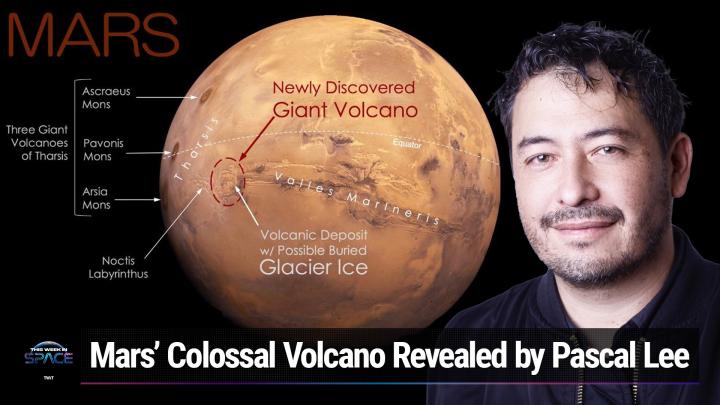Mars' Best-Kept Secret: A Colossal Volcano Revealed by Scientist Pascal Lee
Created with AI, edited by humans.
In our latest episode of This Week in Space, Tariq and I had the pleasure of hosting the indomitable Dr. Pascal Lee, planetary scientist and Director of the Haughton-Mars Project, which hosts a NASA-sponsored Mars analog base in the Arctic. Though I knew Pascal would be discussing a new discovery on Mars, hearing the details of just how he discovered a new, massive volcano on the Red Planet was a bombshell—he and his graduate student associate, Sourabh Shubham, found a monster feature that had been hiding in plain sight for decades! When you watch or listen to this episode, you’ll understand why it had been missed all these years.
As Pascal walked us through the story of Noctis Mons, or "the mountain of the night," I couldn't help but marvel at the fact that this 280-mile-wide giant had gone unnoticed in images captured by Mariner 9 way back in 1971. It's like finding a dinosaur bone sticking out of your driveway and nobody noticing until you point it out. Pascal's discovery is a testament to his keen eye and relentless curiosity.
What really got me going was when Pascal described the unique characteristics of Noctis Mons. Unlike the more pristine volcanoes in the Tharsis region, this one is highly eroded, likely due to glacial ice melting and collapsing over billions of years. As Pascal put it, "You really cannot explain its shape by just tectonics." This erosion has exposed the volcano's inner layers, making it a geologist's dream come true.
But the implications of Noctis Mons go far beyond geology. Pascal's passion was palpable as he discussed the possibility of this site harboring life. With its combination of volcanic heat and glacial ice, Noctis Mons could have sustained life for nearly four billion years. The thought of finding extant life on Mars, and determining whether it's truly alien or related to Earth-based life, is enough to give Tariq and me goosebumps.
As we listened to Pascal, we couldn't help but dream of the day when humans might establish a long-term presence on Mars. Despite the challenges of landing on the Red Planet, Pascal's enthusiasm for Noctis Mons as a potential base location was contagious. I could almost picture a research station nestled near the volcano, with intrepid explorers uncovering the secrets of Mars' rich geological history and possibly even discovering extraterrestrial life. Tariq's quip about JPL's potential involvement, "They do dare mighty things there," only added to the excitement. Of course, Pascal is working with NASA’s Jet Propulsion Laboratory to explore ways to use robotic explorers to presage human astronauts in the region.
As we wrapped up the episode, I found myself eagerly awaiting the publication of Pascal's findings. The discovery of Noctis Mons is a game-changer, and I have no doubt that it will spark a flurry of activity within the scientific community. It's moments like these that remind me why I love hosting "This Week in Space" - the opportunity to share groundbreaking discoveries and explore the limitless possibilities of the universe with our listeners.
And in my fever dreams, I hope to have a large, clumpy Mars terrain feature named after this podcast up there someday…
If you haven't already, be sure to subscribe to This Week in Space so you don't miss out on any of our mind-blowing episodes. And if you can, consider joining Club TWiT to advance the cause! Trust me; you won't want to miss what we have in store for you next!
Clear skies,
Rod Pyle
